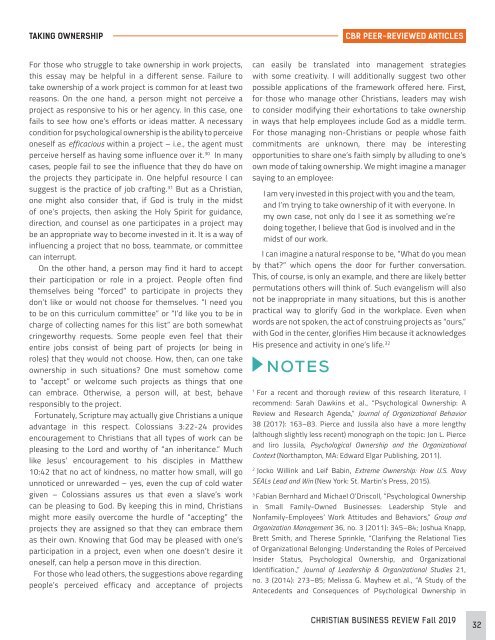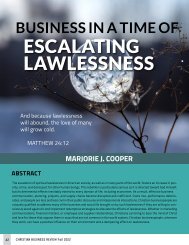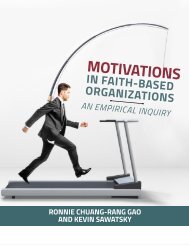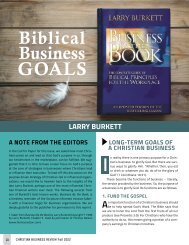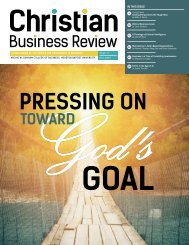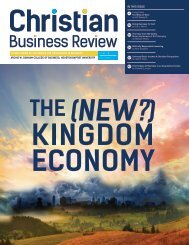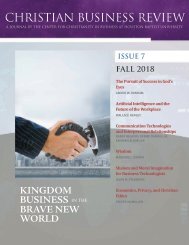Christian Business Review 2019: Workplace Practices That Glorify God (Issue 8)
Create successful ePaper yourself
Turn your PDF publications into a flip-book with our unique Google optimized e-Paper software.
TAKING OWNERSHIP<br />
CBR PEER-REVIEWED ARTICLES<br />
For those who struggle to take ownership in work projects,<br />
this essay may be helpful in a different sense. Failure to<br />
take ownership of a work project is common for at least two<br />
reasons. On the one hand, a person might not perceive a<br />
project as responsive to his or her agency. In this case, one<br />
fails to see how one’s efforts or ideas matter. A necessary<br />
condition for psychological ownership is the ability to perceive<br />
oneself as efficacious within a project – i.e., the agent must<br />
perceive herself as having some influence over it. 30 In many<br />
cases, people fail to see the influence that they do have on<br />
the projects they participate in. One helpful resource I can<br />
suggest is the practice of job crafting. 31 But as a <strong>Christian</strong>,<br />
one might also consider that, if <strong>God</strong> is truly in the midst<br />
of one’s projects, then asking the Holy Spirit for guidance,<br />
direction, and counsel as one participates in a project may<br />
be an appropriate way to become invested in it. It is a way of<br />
influencing a project that no boss, teammate, or committee<br />
can interrupt.<br />
On the other hand, a person may find it hard to accept<br />
their participation or role in a project. People often find<br />
themselves being “forced” to participate in projects they<br />
don’t like or would not choose for themselves. “I need you<br />
to be on this curriculum committee” or “I’d like you to be in<br />
charge of collecting names for this list” are both somewhat<br />
cringeworthy requests. Some people even feel that their<br />
entire jobs consist of being part of projects (or being in<br />
roles) that they would not choose. How, then, can one take<br />
ownership in such situations? One must somehow come<br />
to “accept” or welcome such projects as things that one<br />
can embrace. Otherwise, a person will, at best, behave<br />
responsibly to the project.<br />
Fortunately, Scripture may actually give <strong>Christian</strong>s a unique<br />
advantage in this respect. Colossians 3:22-24 provides<br />
encouragement to <strong>Christian</strong>s that all types of work can be<br />
pleasing to the Lord and worthy of “an inheritance.” Much<br />
like Jesus’ encouragement to his disciples in Matthew<br />
10:42 that no act of kindness, no matter how small, will go<br />
unnoticed or unrewarded – yes, even the cup of cold water<br />
given – Colossians assures us that even a slave’s work<br />
can be pleasing to <strong>God</strong>. By keeping this in mind, <strong>Christian</strong>s<br />
might more easily overcome the hurdle of “accepting” the<br />
projects they are assigned so that they can embrace them<br />
as their own. Knowing that <strong>God</strong> may be pleased with one’s<br />
participation in a project, even when one doesn’t desire it<br />
oneself, can help a person move in this direction.<br />
For those who lead others, the suggestions above regarding<br />
people’s perceived efficacy and acceptance of projects<br />
can easily be translated into management strategies<br />
with some creativity. I will additionally suggest two other<br />
possible applications of the framework offered here. First,<br />
for those who manage other <strong>Christian</strong>s, leaders may wish<br />
to consider modifying their exhortations to take ownership<br />
in ways that help employees include <strong>God</strong> as a middle term.<br />
For those managing non-<strong>Christian</strong>s or people whose faith<br />
commitments are unknown, there may be interesting<br />
opportunities to share one’s faith simply by alluding to one’s<br />
own mode of taking ownership. We might imagine a manager<br />
saying to an employee:<br />
I am very invested in this project with you and the team,<br />
and I’m trying to take ownership of it with everyone. In<br />
my own case, not only do I see it as something we’re<br />
doing together, I believe that <strong>God</strong> is involved and in the<br />
midst of our work.<br />
I can imagine a natural response to be, “What do you mean<br />
by that?” which opens the door for further conversation.<br />
This, of course, is only an example, and there are likely better<br />
permutations others will think of. Such evangelism will also<br />
not be inappropriate in many situations, but this is another<br />
practical way to glorify <strong>God</strong> in the workplace. Even when<br />
words are not spoken, the act of construing projects as “ours,”<br />
with <strong>God</strong> in the center, glorifies Him because it acknowledges<br />
His presence and activity in one’s life. 32<br />
NOTES<br />
1<br />
For a recent and thorough review of this research literature, I<br />
recommend: Sarah Dawkins et al., “Psychological Ownership: A<br />
<strong>Review</strong> and Research Agenda,” Journal of Organizational Behavior<br />
38 (2017): 163–83. Pierce and Jussila also have a more lengthy<br />
(although slightly less recent) monograph on the topic: Jon L. Pierce<br />
and Iiro Jussila, Psychological Ownership and the Organizational<br />
Context (Northampton, MA: Edward Elgar Publishing, 2011).<br />
2<br />
Jocko Willink and Leif Babin, Extreme Ownership: How U.S. Navy<br />
SEALs Lead and Win (New York: St. Martin’s Press, 2015).<br />
3<br />
Fabian Bernhard and Michael O’Driscoll, “Psychological Ownership<br />
in Small Family-Owned <strong>Business</strong>es: Leadership Style and<br />
Nonfamily-Employees’ Work Attitudes and Behaviors,” Group and<br />
Organization Management 36, no. 3 (2011): 345–84; Joshua Knapp,<br />
Brett Smith, and Therese Sprinkle, “Clarifying the Relational Ties<br />
of Organizational Belonging: Understanding the Roles of Perceived<br />
Insider Status, Psychological Ownership, and Organizational<br />
Identification.,” Journal of Leadership & Organizational Studies 21,<br />
no. 3 (2014): 273–85; Melissa G. Mayhew et al., “A Study of the<br />
Antecedents and Consequences of Psychological Ownership in<br />
CHRISTIAN BUSINESS REVIEW Fall <strong>2019</strong><br />
32 2


